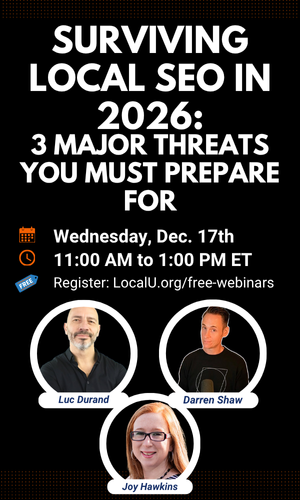Just as Linda already mentioned, results in terms of local SEO are starting to be a lot more difficult to track. I'll list here a few of the options I tested with my clients, note that each comes with a major downside. Frankly, I am faaaar from having discovered the perfect results measurement methods.
1. Monitor Traffic - few years ago traffic estimations could be done properly with the help of a few handy (and some even free) tools. The TOP3 results for exact queries usually got a certain percentage of clicks, while the next 4-10 positions got less clicks. Nowadays predicting traffic is almost impossible, since we can't even tell how many results Google will display on a result page (as some recently noticed, Google has started switching from 7pack to 3pack). Also, accurate traffic estimations for the new Google Maps interface seem almost like an impossible task, but maybe we'll get to know more about this in the next few months.
2. Monitor Conversions - this has always been one of my least preferred methods, as conversions depend on a lot of variables (most of them not related to the SEO's job). I'll list here just a few of them:
- page design, structure, landing page optimization: if the customer gets lost on the page or is overwhelmed with badly structured content and page errors, he will most certainly click "X" without buying anything.
- bad or overpriced products: if your client's company sells red whine for 50$ per bottle, while competing sites sell it for 5-10$, guess who will get the most sales. A hint: it won't be your client's website.

- unfriendly personnel: sometimes every online aspect was truly accomplished. The client has a beautiful, well-optimized, user-friendly website, he works with a great SEM team, he sells wonderful products at great prices, but the local personnel just stinks. A client calls and wants to make a reservation and stumbles over one of those highly unfriendly voices, who fail in providing information, treating the client nicely and solving his/her problems. Bad personnel is the no. 1 recipe for losing clients and winning negative reviews on your Google+ Page.
3. Monitor SERP Results - this is just as difficult as the other two options, SERP results are no longer clearly fixed positions, they vary by country, city, and even neighborhood, device, browser, browsing history a.o. criteria. It's almost impossible to create a measurement of all these things. In additional to that, local SEO will soon no longer be merely SERP focused, with the new Google Maps we will have to develop ways of tracking business visibility on a map (for example, few months from here we might be telling our clients something like: "your business is visible when zooming out up to a scale of X").
In the end I believe it's best to see how your client-agency relationship works and adjust your result measurements accordingly, by combining some of the above described methods (and even adding more to the mix).\
Hope my answer will serve as a good starting point.







